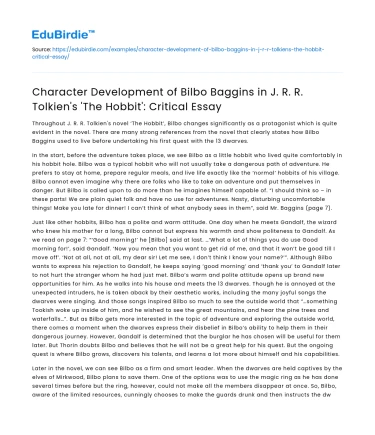Throughout J. R. R. Tolkien's novel ‘The Hobbit’, Bilbo changes significantly as a protagonist which is quite evident in the novel. There are many strong references from the novel that clearly states how Bilbo Baggins used to live before undertaking his first quest with the 13 dwarves.
In the start, before the adventure takes place, we see Bilbo as a little hobbit who lived quite comfortably in his hobbit hole. Bilbo was a typical hobbit who will not usually take a dangerous path of adventure. He prefers to stay at home, prepare regular meals, and live life exactly like the ‘normal’ hobbits of his village. Bilbo cannot even imagine why there are folks who like to take an adventure and put themselves in danger. But Bilbo is called upon to do more than he imagines himself capable of. “I should think so – in these parts! We are plain quiet folk and have no use for adventures. Nasty, disturbing uncomfortable things! Make you late for dinner! I can’t think of what anybody sees in them”, said Mr. Baggins (page 7).
Just like other hobbits, Bilbo has a polite and warm attitude. One day when he meets Gandalf, the wizard who knew his mother for a long, Bilbo cannot but express his warmth and show politeness to Gandalf. As we read on page 7: “‘Good morning!’ he [Bilbo] said at last. …‘What a lot of things you do use Good morning for!’, said Gandalf. ‘Now you mean that you want to get rid of me, and that it won’t be good till I move off’. ‘Not at all, not at all, my dear sir! Let me see, I don’t think I know your name?’”. Although Bilbo wants to express his rejection to Gandalf, he keeps saying ‘good morning’ and ‘thank you’ to Gandalf later to not hurt the stranger whom he had just met. Bilbo’s warm and polite attitude opens up brand new opportunities for him. As he walks into his house and meets the 13 dwarves. Though he is annoyed at the unexpected intruders, he is taken aback by their aesthetic works, including the many joyful songs the dwarves were singing. And those songs inspired Bilbo so much to see the outside world that “…something Tookish woke up inside of him, and he wished to see the great mountains, and hear the pine trees and waterfalls…”. But as Bilbo gets more interested in the topic of adventure and exploring the outside world, there comes a moment when the dwarves express their disbelief in Bilbo’s ability to help them in their dangerous journey. However, Gandalf is determined that the burglar he has chosen will be useful for them later. But Thorin doubts Bilbo and believes that he will not be a great help for his quest. But the ongoing quest is where Bilbo grows, discovers his talents, and learns a lot more about himself and his capabilities.
Later in the novel, we can see Bilbo as a firm and smart leader. When the dwarves are held captives by the elves of Mirkwood, Bilbo plans to save them. One of the options was to use the magic ring as he has done several times before but the ring, however, could not make all the members disappear at once. So, Bilbo, aware of the limited resources, cunningly chooses to make the guards drunk and then instructs the dwarves to escape through the underground tunnel in barrels.
We can see that throughout the book, Bilbo gets stronger from day to day. The various challenges that are laid before the troop, help Bilbo become more self-confident, independent, clever, and brave and open up new opportunities where he confronts challenges and hardships out of his comfort zone. Bilbo becomes more self-confident and learns a lot more about his capabilities. He outsmarts Gollum with his thoughtful riddles, and when he escapes the cave and is wise enough to wear the ring, quickly determines its power and utilizes that power effectively.
We can see that Bilbo not only earns respect from the dwarves, but he was also well-appreciated, and they were more than astonished at his quiet arrival. And if they had doubted that he was their first-class burglar, in spite of Gandalf’s words, it’s quite evident that they doubt no longer: “The dwarves looked at him with quite a new respect, when he talked about dodging guards, jumping over Gollum … ‘What did I tell you?’ said Gandalf laughing. ‘Mr. Baggins has more about him that you guess’”.
After rescuing the dwarves and heroically saving himself from Gollum, Bilbo fights for the dwarves head-to-head with dozens of flesh-eating spiders. Bilbo and the dwarves seemed to be getting into a lot of trouble without Gandalf’s guidance and power. And when Bilbo finds himself face to face with hideous, flesh-eating spiders, he finds courage, whips out his swords, and slays the spiders, one after another. He emerges victoriously after saving each dwarf. Bilbo suddenly discovers the bravery that he did not know he had. We can see that the dwarves “... knew only too well that they would soon have all been dead if it hadn’t been for the hobbit…”. We can later see how grateful the dwarves were to have a burglar like Bilbo: “...some of them even got up bowed right to the ground before him … for they saw that he had some wits, as well as luck and a magic ring – all three are very useful possessions …”. The incident of killing spiders is a turning point for Bilbo. He is conscious of feeling braver and fearless each day, after every battle and fight.






 Stuck on your essay?
Stuck on your essay?

